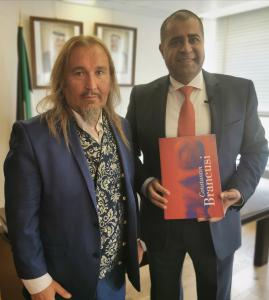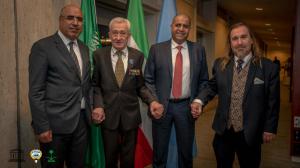Adam Al Mulla, Ambassador of State of Kuweit to Unesco met Thierry Rayer, to discuss the Right to Happiness issues
His Excellency Thierry Rayer met His Excellency Adam Al Mulla, Ambassador Permanent of State of Kuweit to Unesco, to discuss the Right to Happiness issues.
PARIS, FRANCE, September 3, 2020 /EINPresswire.com/ -- His Excellency Mr Adam Al Mulla will receive on September 21 at UNESCO Headquarters the dove with the golden clover for the World League for the Right to Happiness for the State of Kuweit, sponsored by Thierry Rayer, Ambassador of the Right to Happiness League in charge of Relations with States and their Representatives, Honorary Member, Golden Clover 2019.
Kuwait : Universal Art and Islam – the Al-Sabah Collection
The al Sabah collection began to take shape in 1975 when Sheikh Nasser Sabah al Ahmed al Sabah purchased the first object in the collection. It was an enamelled glass bottle from the mid-14th century that he had found in a London art gallery. At that time, the collection began as a hobby that he and his wife Sheikha Hussah Sabah al Salem al Sabah pursued – it soon developed into a full-fledged collection worthy of its place in a museum.
In 1983, as the collection grew, it left Sheikh Nasser’s private residence for its new location: the National Museum of Kuwait. The building was then known as Dar al Athar al Islamiyyah (DAI). Sheikha Hussah became the general director of the museum. The collection grew year after year to reach more than 30,000 objects today, all representing different chronological and geographical points of the Islamic world.
An impressive collection
The al Sabah collection is considered by international authorities to be one of the few most complete collections of Islamic art in the world. It has grown steadily since its creation, increasing its holdings in all categories: weapons and armour, calligraphy, carpets and textiles, coins, glass, hard stones, ivory, jewellery, manuscripts and miniatures, metal, stone and stucco work, and woodwork. The collection has a long history of publishing works that allow visitors to discover the works it holds. It regularly organizes exhibitions of international renown and has a tradition of lending certain objects to exhibitions elsewhere in the world.
Women’s right to vote, a victory for democracy
An “historic moment”. Kuwaiti women won the right to vote and stand for election for the first time in 2005, after an amendment to the electoral law passed on Monday (May 16) by the parliament of this conservative Gulf monarchy. The Islamist deputies, who were opposed to granting women their political rights, however succeeded, with their tribal allies in Parliament, in including in the amended text a clause stipulating that women must, in the exercise of their rights, to comply with “Islamic norms”. “I congratulate the Kuwaiti woman for obtaining her political rights,” Kuwaiti Prime Minister Sabah Al-Ahmad Al-Sabah said, announcing to reporters his intention to “appoint a woman to the government.
Traditional and modern at the same time, Kuwait is unique in many ways.
Traditional and modern at the same time, Kuwait is unique in many ways. In addition to its serious financial capacities, essentially provided by its oil revenues, the country stands out in particular by the solidity of its governmental institutions and its legal environment. Kuwait is also distinguished by its democratic institutions among the most advanced in the Arab world and by an active political life, notably through the media and civil society organizations.
The Kuwaiti market is reborn. Long known for its economic (and political) liberalism, Kuwait took a big step to improve its business environment by implementing, in 2013, a law for direct investments (FDI) aimed at alleviating the constraints of doing business. in Kuwait. Unlike some MENA markets, the Kuwaiti market is not saturated.
Happiness defined by the State of Kuweit
The right to happiness was born in France in the Declaration of the Rights of Man and of the Citizen of 1789. It is said in its introduction that the role of the State is to guarantee happiness to everyone, by fulfilling as much as it can the desires of every human being and allowing it to satisfy them in order to achieve happiness.
The state of Kuwait defines the right of happiness in two main concepts. First the concept of equality regardless of gender, race, special needs, and unprivileged. The second main concept is for Kuwait to provide the infrastructure for all those mentioned.
Art : a source of happiness
Works of art are a source of happiness but varying in degrees in individuals. We all know people who breathe art for a living, while others may be subconsciously enjoy it.
But the knowledge gap is still deep, and many art works are not sufficiently accessible to the citizens of the world.
Concrete initiatives lead by the State of Kuwait to stimulate individual and collective happiness
The State of Kuweit favors Art and creativity in all its forms, a sign of its dynamism, its world-renowned museum presentations and its international influence.
We let you watch the video of His Excellency Mr Adam Al Mulla Ambassador Permanent Delegate of State of Kuweit to Unesco.
Martin Mbita
Universae
+33 6 51 60 18 07
email us here
Thierry Rayer met His Excellency Adam Al Mulla, Ambassador Permanent Delegate of State of Kuweit to Unesco, to discuss the Right to Happiness issues.



